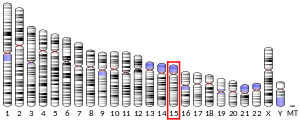SPTBN5
Appearance
(Redirected from SPTBN5 (gene))
| SPTBN5 | |||||||||||||||||||||||||||||||||||||||||||||||||||
|---|---|---|---|---|---|---|---|---|---|---|---|---|---|---|---|---|---|---|---|---|---|---|---|---|---|---|---|---|---|---|---|---|---|---|---|---|---|---|---|---|---|---|---|---|---|---|---|---|---|---|---|
| Identifiers | |||||||||||||||||||||||||||||||||||||||||||||||||||
| Aliases | SPTBN5, BSPECV, HUBSPECV, HUSPECV, spectrin beta, non-erythrocytic 5 | ||||||||||||||||||||||||||||||||||||||||||||||||||
| External IDs | OMIM: 605916; MGI: 2685200; HomoloGene: 41150; GeneCards: SPTBN5; OMA:SPTBN5 - orthologs | ||||||||||||||||||||||||||||||||||||||||||||||||||
| |||||||||||||||||||||||||||||||||||||||||||||||||||
| |||||||||||||||||||||||||||||||||||||||||||||||||||
| |||||||||||||||||||||||||||||||||||||||||||||||||||
| |||||||||||||||||||||||||||||||||||||||||||||||||||
| |||||||||||||||||||||||||||||||||||||||||||||||||||
| Wikidata | |||||||||||||||||||||||||||||||||||||||||||||||||||
| |||||||||||||||||||||||||||||||||||||||||||||||||||
Spectrin, beta, non-erythrocytic 5 also known as SPTBN5 is a protein that in humans is encoded by the SPTBN5 gene.[5] SPTBN5 belongs to the spectrin family of cytoskeletal proteins.
Structure and function
[edit]SPTBN5 contains the following domains:[5]
- actin-binding domain
- membrane-association domain-1
- self-association domain
- C-terminal pleckstrin homology domain.
Based on these structural features it is thought that SPTBN5 is likely to form heterodimers and oligomers with alpha-spectrin and to interact directly with cellular membranes.[5]
SPTBN5 is highly expressed in embryoid bodies.[6]
References
[edit]- ^ a b c GRCh38: Ensembl release 89: ENSG00000137877 – Ensembl, May 2017
- ^ a b c GRCm38: Ensembl release 89: ENSMUSG00000074899 – Ensembl, May 2017
- ^ "Human PubMed Reference:". National Center for Biotechnology Information, U.S. National Library of Medicine.
- ^ "Mouse PubMed Reference:". National Center for Biotechnology Information, U.S. National Library of Medicine.
- ^ a b c Stabach PR, Morrow JS (July 2000). "Identification and characterization of beta V spectrin, a mammalian ortholog of Drosophila beta H spectrin". J. Biol. Chem. 275 (28): 21385–95. doi:10.1074/jbc.C000159200. PMID 10764729.
- ^ Chaerkady R, Kerr CL, Marimuthu A, Kelkar DS, Kashyap MK, Gucek M, Gearhart JD, Pandey A (January 2009). "Temporal analysis of neural differentiation using quantitative proteomics". J. Proteome Res. 8 (3): 1315–26. doi:10.1021/pr8006667. PMC 2693473. PMID 19173612.
Further reading
[edit]- Odell AF, Van Helden DF, Scott JL (2008). "The spectrin cytoskeleton influences the surface expression and activation of human transient receptor potential channel 4 channels". J. Biol. Chem. 283 (7): 4395–407. doi:10.1074/jbc.M709729200. hdl:1959.13/39937. PMID 18048348.
- Oguri M, Kato K, Yokoi K, et al. (2010). "Assessment of a polymorphism of SDK1 with hypertension in Japanese Individuals". Am. J. Hypertens. 23 (1): 70–7. doi:10.1038/ajh.2009.190. PMID 19851296.
- Shoeman RL, Hartig R, Hauses C, Traub P (2002). "Organization of focal adhesion plaques is disrupted by action of the HIV-1 protease". Cell Biol. Int. 26 (6): 529–39. doi:10.1006/cbir.2002.0895. PMID 12119179. S2CID 39778155.
- Chardin P, Camonis JH, Gale NW, et al. (1993). "Human Sos1: a guanine nucleotide exchange factor for Ras that binds to GRB2". Science. 260 (5112): 1338–43. Bibcode:1993Sci...260.1338C. doi:10.1126/science.8493579. PMID 8493579.




